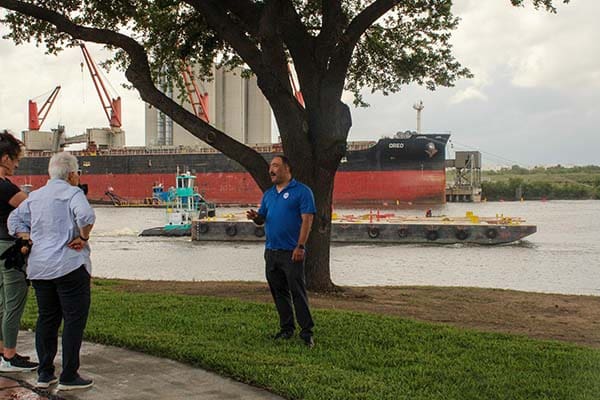1988

A few concerned residents join forces to form a group to prevent and eliminate smog in the Houston region. They named the group GHASP: the Galveston-Houston Association for Smog Prevention. Out of this grassroots effort, GHASP becomes a Texas nonprofit corporation in 1992.
1996

Another Texas nonprofit, Mothers for Clean Air (MfCA), is formed with the purpose of providing community-based outreach and advocacy.
2000

Mothers for Clean Air debuts Ozone Theater. From this time through 2019, tens of thousands of students have learned about unhealthy air and its impact on health. In 2007, the program receives an EPA “Clean Air Excellence Award.”
2001
John D. Wilson becomes Executive Director of GHASP and Jane Laping becomes Executive Director of MfCA.
2004
GHASP and Mothers for Clean Air begin to host monthly Air Exchange meetings where Houston residents get to hear from and engage with local environmental experts and policymakers. The meetings are organized every month from 2004 through 2010.
2004

MfCA begins hosting the largest Earth Day celebration in Houston. MfCA, and later Air Alliance Houston, continues to host the event from 2004 through 2016. An Annual Earth Day Art Auction is established to support AAH education outreach programs and to provide scholarships to local schools and students.
2005
The GHASP Executive Director John Wilson and Board Members are invited to Houston City Hall to educate Houston Mayor Bill White on the state of Houston’s air quality following the Houston Chronicle’s landmark news series, In Harm’s Way. The Mayor commissions a study outlining air pollutants that pose the biggest health risks in the Greater Houston Area and the neighborhoods in which the risks are highest.
2005
A GHASP-affiliated group, Industry Professionals for Clean Air, produces a White Paper, Reducing Flare Emissions from Chemical Plants and Refineries: An Analysis of Industrial Flares’ Contribution to the Gulf Coast Region’s Air Pollution Problem, which is used by the U.S. EPA to modify flaring rules for petroleum refineries.
2006
Sabrina Strawn is named as the Executive Director of GHASP.
2007
Dr. Matthew Tejada follows Sabrina Strawn as GHASP’s new Executive Director.
2008

GHASP and MfCA decide to join together as one organization: GHASP/MfCA. The previous activities of GHASP and MfCA fit together like pieces in a puzzle. The new organization combines and strengthens the goals of both organizations: to influence public policy on air quality and environmental health issues in order to protect the health of residents and improve their quality of life.
2008
Dr. Matthew Tejada is appointed as the Executive Director of the newly merged GHASP/MfCA.
2008
Results from GHASP/MfCA’s community-based ozone monitoring network prompt UH-Sugar Land to install ozone monitors that are quickly incorporated into the TCEQ’s monitoring network.
2010
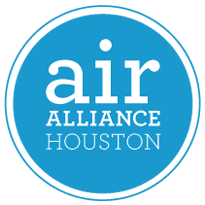
In January 2010, the new organization is renamed as Air Alliance Houston (AAH). Air Alliance Houston’s mission is to reduce the public health impacts from air pollution through research, education, and advocacy.
2012

In November 2012, Air Alliance Houston, together with partner organizations, launches the Healthy Port Communities Coalition (HPCC). Today, the HPCC continues to be a strong voice in advocating for the health and wellbeing of Houston’s portside communities disproportionately impacted by pollution from the Houston Ship Channel.
2013
Dr. Matthew Tejada becomes Director of the Office of Environmental Justice of the US EPA. Adrian Shelley is appointed as the new Executive Director of Air Alliance Houston.
2014
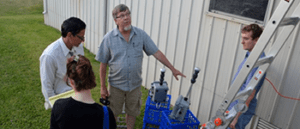
Air Alliance Houston publishes the final report and results of a year-long community air monitoring project at Galena Park. The results show unacceptable health risks due to diesel and particulate matter pollution and recommend several steps to reduce the residents’ exposure.
2015

Air Alliance Houston helps pass anti-idling ordinances for heavy diesel vehicles in the cities of Houston, Galena Park and Jacinto City, and subsequently launches anti-idling campaign in the city of Pasadena. Avoiding idling time has multiple benefits, including reducing air pollution exposure, in particular that of children who breathe closer to the ground and therefore closer to vehicle tailpipes.
2015

Intensive advocacy by Air Alliance Houston and other groups, starting with a lawsuit filed against the EPA in 2012 and subsequent benzene monitoring study in Galena Park, play a central role in the promulgation of a new EPA “Petroleum Refinery Sector Rule.” This legislation will reduce air emissions from petroleum refineries and install fenceline monitoring systems to protect neighboring communities.
2016
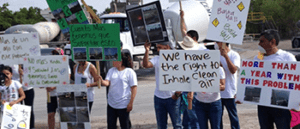
Air Alliance Houston initiates its community engagement and advocacy efforts to limit concrete batch plants and their siting close to schools, parks and homes. AAH participates in community meetings with Lindale Farms neighbors to protest against the polluting activities and the around-the-clock noise of the Integrity Ready Mix and Aurora Ready Mix concrete batch plants.
2017

Air Alliance Houston partners with other environmental groups to establish a collaborative effort, branded One Breath Partnership, in order to elevate awareness about the harmful effects of air pollution by amplifying the work of local researchers and encouraging affected residents to share their stories.
2017
Dr. Bakeyah S. Nelson becomes the first woman of color to lead Air Alliance Houston in March 2017.
2017

Recognizing the need to ensure a more equitable and resilient future for the region post-Hurricane Harvey, Dr. Nelson and Jennifer Powis (The Powis Firm) convene environmental and social justice groups to develop a common policy agenda, leading to the establishment of the Coalition for Environment, Equity, and Resilience (CEER) in 2018.
2018
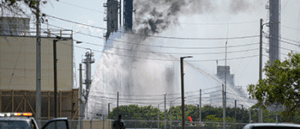
Air Alliance Houston and partners file and win two critical lawsuits – one against the EPA for delaying the Chemical Disaster Rule which requires facilities to strengthen their safety protections, and the other against the Chemical Safety Board for not complying with the Clean Air Act requirement to inform the public about the toxic releases from chemical incidents.
2019

In March 2019, Dr. Bakeyah Nelson testifies before the US Congress regarding stalled Clean Air Act enforcement since the 2016 Presidential Election.
2019
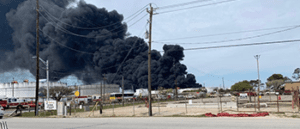
During March and April 2019, Air Alliance Houston staff lead the way in providing information to the public regarding the devastating ITC and KMCO industrial fires. The ITC fire cast thick plumes of toxic smoke over the region for several days, causing shelters-in-place and halting traffic in the Houston Ship Channel. The KMCO explosion kills one plant worker and injures 10 others. AAH, together with partners, express the urgent need to address the deficiencies in emergency preparedness, enforcement, and air monitoring by regulatory agencies.
2019
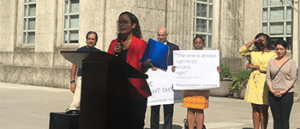

Air Alliance Houston releases results of a Health Impact Assessment (HIA) of the Texas Department of Transportation’s North Houston Highway Improvement project (NHHIP), or I-45 expansion. The report informs decision-makers about the project’s potential harmful health effects to communities, specifically those impacting children that go to school nearby the planned expansion, and urges TxDOT to adopt a number of mitigation strategies.
2019
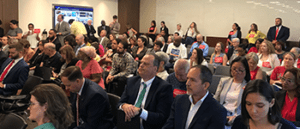

Air Alliance Houston and partners advocate for a delay in the vote to move ahead with TxDOT’s controversial I-45 expansion project. Over 130 Houstonians rally on July 23 to air their concerns to the Houston-Galveston Area Council’s Transportation Policy Council. Following the community outcry, the Council commits an additional $51.5 million toward community planning and mitigation.
2019



Air Alliance Houston and partners successfully advocate for the Harris County Commissioners Court to grow the county’s emergency response infrastructure. September 10, the Court unanimously votes in favor of investing a total of $11.6 million to modernize and better equip the fire marshal’s office, pollution control and public health departments.
2019
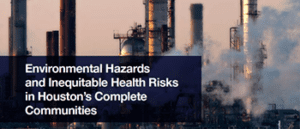

A new study by Air Alliance Houston and the Rice University’s Kinder Institute for Urban Research documents the location of hazardous facilities and sites in Houston’s initial five pilot Complete Communities and associated health risks faced by people living near polluting industries.
2020
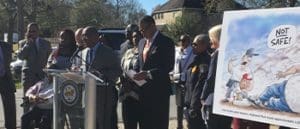

On January 22, in a huge win for healthy neighborhoods everywhere, Soto Ready Mix withdraws its application to build a concrete batch plant in Houston’s Acres Homes neighborhood thanks to the resolute opposition of AAH, community leaders, and Houston’s elected representatives.
2020
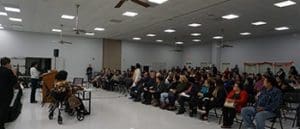

In another big win for healthy communities, Nomadic Aggregates, LLC, withdraws its application to construct a concrete batch plant in Aldine during a public meeting on January 30, after being faced with fierce organizing and opposition from residents supported by AAH and elected officials.
2021


Air Alliance Houston plays an important role in the development of Houston’s first-ever Climate Action Plan (CAP), launched April 22nd, by co-leading the Transportation Working Group (WP). AAH continues to direct the Transportation WG and advocate for greater equity as the city moves to the implementation phase.
2021


In response to official complaints filed by advocates drawing attention to the I-45 Expansion’s civil rights and environmental justice issues, on March 8, federal authorities ask the Texas Department of Transportation (TxDOT) to pause the project in order to review potential violations of Title VI of the Civil Rights Act of 1964. Right after, on March 11, Harris County Attorney’s Office sues TxDOT over the project in response to community concerns about displacement and environmental impacts. The federal intervention and local officials’ opposition is a huge win for impacted residents along the I-45 and in setting a precedent for highway fighters across the country.
2021


Air Alliance Houston and other local environmental groups’ efforts in urging Harris County to create a regional initiative to address climate change pay off on July 20 as the County announces the creation of an Office of Sustainability and the development of a Climate Justice and Action Plan.
2021


Air Alliance Houston, in partnership with LINK Houston and the Robert D. Bullard Center for Environmental and Climate Justice at Texas Southern University, releases a new report, “COVID and Public Transportation in the Houston Region,” that looked at the COVID-19 pandemic’s impact on Houstonians’ relationship with public transportation. The study shows COVID further highlighted the importance of reliable public transportation and the need for increased support for transit agencies from all levels of government. The findings and recommendations inform the future transportation policy and planning as the Houston region, and the country, creep toward a “new normal.”
